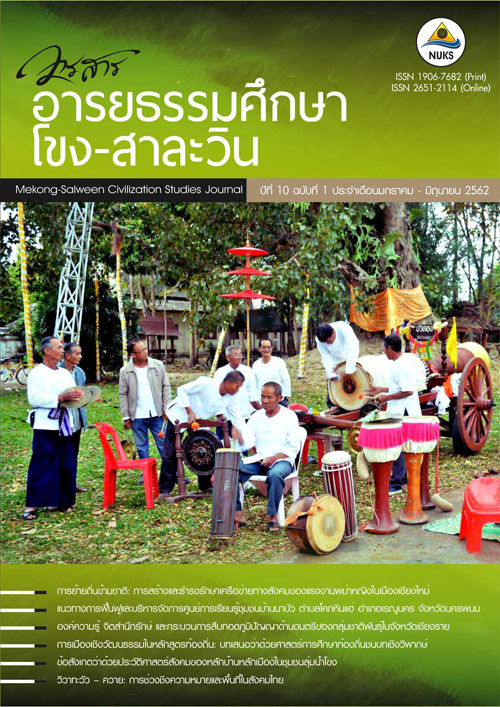ข้อตกลง
1. บทความทุกบทความจะได้รับการพิจารณาจากผู้ทรงคุณวุฒิ (Peer review) ที่ตรงตามสาขาวิชา โดยทุกบทความจะต้องผ่านการพิจารณาจากผู้ทรงคุณวุฒิ อย่างน้อยบทความละ 3 ท่าน
2. บทความ ข้อความ ภาพประกอบ และตารางใด ๆ ที่ตีพิมพ์ในวารสารอารยธรรมศึกษา โขง-สาละวิน เป็นความคิดเห็นส่วนตัวของผู้เขียน กองบรรณาธิการไม่จำเป็นต้องเห็นด้วยเสมอไป และไม่ใช่ความรับผิดชอบของ กองส่งเสริมศิลปวัฒนธรรม มหาวิทยาลัยนเรศวร ถือเป็นความรับผิดชอบของผู้เขียนแต่เพียงผู้เดียว
3. บทความจะต้องไม่เคยตีพิมพ์เผยแพร่ที่ใดมาก่อน และไม่อยู่ระหว่างการพิจารณาของวารสารฉบับอื่น หากตรวจสอบพบว่ามีการตีพิมพ์ซ้ำซ้อน ถือเป็นความรับผิดชอบของผู้เขียนแต่เพียงผู้เดียว
4. บทความที่ส่งถึงกองบรรณาธิการ ขอสงวนสิทธิ์จะไม่ส่งคืน
The Cultural Politics in Local Curriculum: An Introductory Essay on Critical Studies in Rural Education
The Cultural Politics in Local Curriculum: An Introductory Essay on Critical Studies in Rural Education
Keywords:
local curriculum, rural education, place-based education, critical pedagogy, cultural politicsAbstract
The article aimed at understanding the cultural politics in local curriculum by reviewing and analyzing the relevant documents. There were three main objectives in this study as follows: 1) the theoretical presentation of conceptions and boundaries of localness in local curriculum 2) the analysis and discussion on the re-conceptualization of curriculum as junctures of discourse 3) the discussion of issues and concerns regarding the contested space in rural education through local curriculum. The author will propose the framework for developing local curriculum based on critical education theory in the next article. The most important aim of this article is to re-conceptualize the curriculum conception which perceives curriculum as text and discourse. Therefore, local curriculum does not neutrally exist and holds no political orientations. Local curriculum, instead, is a space for cultural politics in the basic education context that is deeply entrenched in contested definition of localness in both rural and urban areas under the administrative control of Thailand’s Ministry of Education.
References
Berry, W. (2001). The unsettling of America. The art of the commonplace: The agrarian essays of Wendell Berry. Washington, DC: Shoemaker and Hoard.
Bureau of Academic Affairs and Educational Standards, Ministry of Education. (2010). Technical terms on curriculum: the basic education core curriculum B.E. 2551. Bangkok: the agricultural co-operative federation of Thailand, LTD.
Charoensin-o-larn, C. (1999). Development discourse: Power, knowledge, truth, identity and the otherness. Bangkok: Vibhasa.
Chuven, Y. (2008). The half century of the inquiries and pathways for the future of Thai local history. Bangkok: Thailand Research Funds (TRF).
Department of Education, Ministry of Education. (1999). The development of social studies syllabus in accordance with the local contexts. in the secondary education curriculum revised edition B.E. 1990. Bangkok: the curriculum development center.
Department of Education, Ministry of Education. (2000). Local contexts and curriculum development. Bangkok: the curriculum development center.
Fawcett, L., Bell, A.C., & Russell, C.L. (2002). Guiding our environmental praxis: Teaching for social and environmental justice. In Teaching sustainability at universities: Towards curriculum greening. New York: Peter Lang.
Foucault, M. (1972). The archeology of knowledge. New York, NY: Pantheon.
Gaudelli, W. (2008). World class: Teaching and learning in global times. Mahwah, NJ: Lawrence Erlbaum Associates.
Gruenewald, D.A. and Smith, G.A. (2008). Place-based education in the global age. New York: Lawrence Erlbaum Associates.
Jatuporn, O. & Wattanatorn, A. (2014). Paradigm and ideologies in curriculum development: From scientific management to emancipatory paradigm. Journal of education studies, Chulalongkorn University, 42(3), 160-174.
Jatuporn, O. & Wattanatorn, A. (2014). Local curriculum: A discourse on curriculum and trends in curriculum research from critical and postmodern perspectives. Journal of education, Naresuan University, 16(3), 200-213.
Jeeradechakul, P. (2007). The trajectories of the community construction in Thai society. The grounded theory on the community construction. Bangkok: Thailand Research Funds (TRF).
Kanjanaphan, A. (1996). Thai society in the thoughts and imaginations of Chattip Natsupa’s writings. The project on Thai society in the imaginations of senior intellectuals. Bangkok: Thailand Research Funds (TRF).
Kittiarsa, P. (2003). Localism. Bangkok: In-som funds for the anthropological research.
McInerney, P., Smyth, J., and Down, B. (2011). “Coming to a place near you?” The politics and possibilities of critical pedagogy of place-based education. Asia-Pacific journal of teacher education, 39(1), pp. 3-16.
Muensaen, T. & Nawarat, N. (2017). Saw vocal tradition in local schooling: The contestation between official knowledge and localized knowledge. The collected essays on old Lanna and new Lanna: The revisited and challenges of Lanna studies toward new decades. Chiangmai: The 13th International Conference on Thai Studies, July 15-18, 2017.
Nakornthap et al. (2008). Education in the community: the synthesis of experiences in the research projects on education and community. Bangkok: Thailand Research Funds (TRF).
Pinar, W.F. (1995). Understanding curriculum: An introduction to the study of historical and Contemporary curriculum discourses. New York, NY: Lang.
Pinar, W.F., et al. (2006). Understanding curriculum: An introduction to the study of historical and contemporary curriculum discourse. New York: Peter Lang.
Promata, S. & Khamawattana, P. (2016) Synthesis of thesis on local curriculum development in Thailand. Journal of education studies, Chulalongkorn University, 44(2), 183-201.
Rakyutidharm, A. (2011). Mainstream alternative development. Journal of sociology and anthropology, 30(2), 13-43.
Sattayanurak, A. (2005). History for community: New directions of local history education. Bangkok: Thailand Research Funds.
Sattayanurak, A. (2016). Opening eyes and mouth from farmers to entrepreneurs. Bangkok: Matichon.
Sterling, S. (1996). Education in change. Education for sustainability. London: Earthscan.
Thongthew, S. (2002). Principle and guideline for school-based curriculum development: A case study of science subject in primary education level. Bangkok: Textbook and academic document center, faculty of education, Chulalongkorn University.








